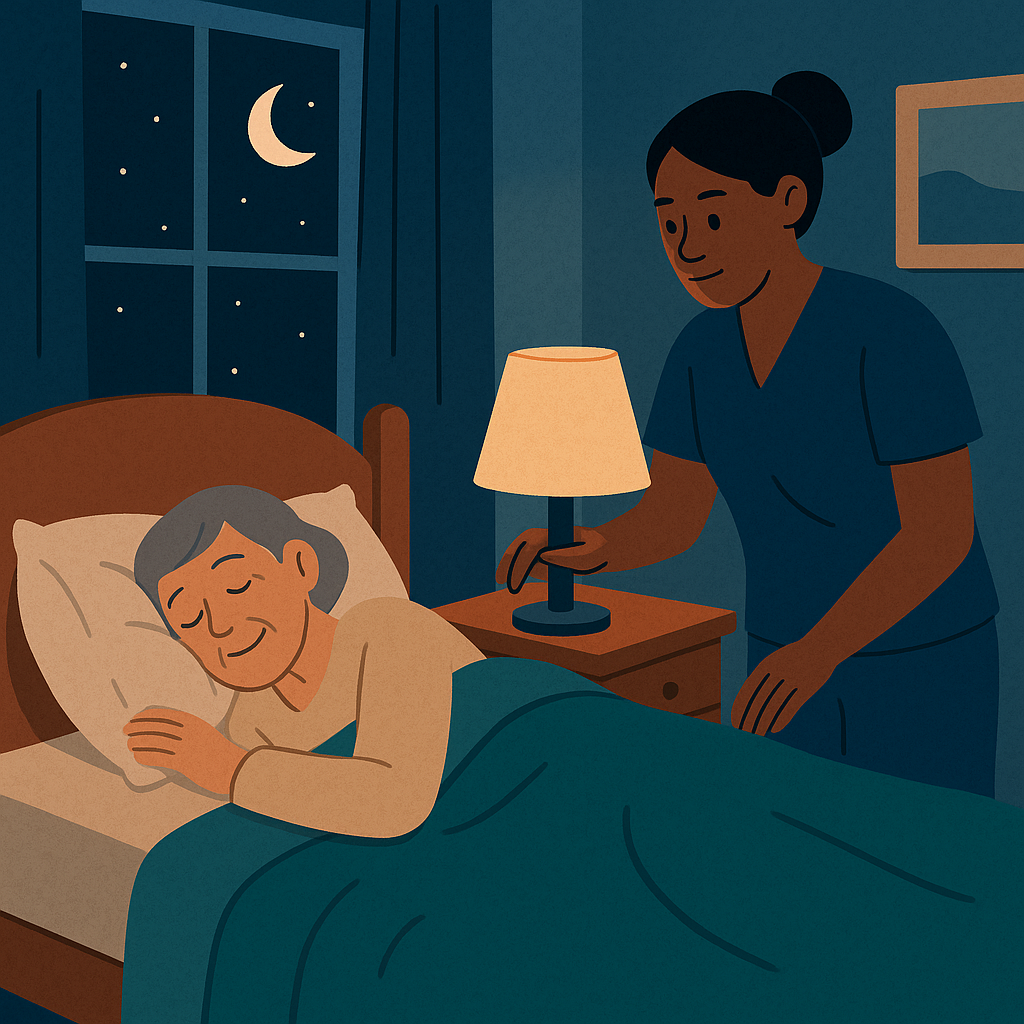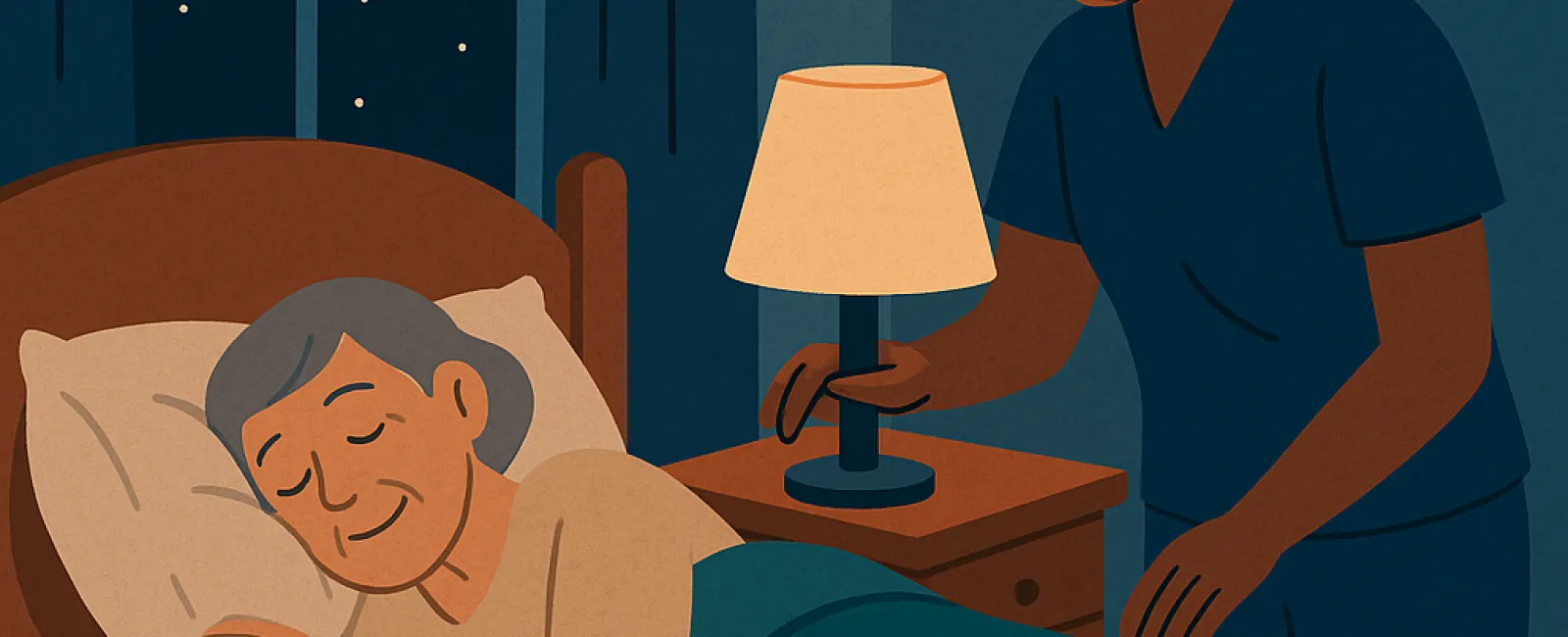How to Help Seniors Sleep Better at Night (and Why It Matters More Than You Think)
For most of us, a good night's sleep feels like a luxury, but for older adults, it's essential. Sleep helps the body heal, boosts mood, and keeps the brain sharp. Yet millions of seniors struggle to fall asleep, stay asleep, or feel rested when morning comes.
Whether your loved one is dealing with restless nights, frequent wakeups, or early-morning grogginess, you're not alone. The good news? Better sleep for seniors isn't impossible; it just takes the right mix of routine, comfort, and support. Let's look at what really helps older adults sleep better, what might be getting in the way, and how 4 Seasons caregivers can lend a hand.
Table of Contents
- Why Sleep Matters More as We Age
- Common Sleep Problems in Seniors
- Simple Fixes for Better Rest
- Common Sleep Issues and Solutions
- How Caregivers Can Help Seniors Sleep Better
- FAQs About Senior Sleep
Why Sleep Matters More as We Age
As we get older, our bodies change in all sorts of ways, including how we sleep. Seniors tend to spend less time in deep, restorative sleep and more time in lighter stages of rest. That's one reason they might wake up frequently during the night or feel drowsy during the day.
But sleep is more than just rest...it's medicine. Studies show that lack of sleep in older adults is linked to memory loss, weakened immunity, and higher risk of falls and depression. It even affects balance and decision-making. Simply put, when your loved one doesn't sleep well, everything else gets harder.
So if Mom's been up half the night watching TV or Dad naps for hours during the day but still feels tired, it's time to dig deeper into what's going on.
Common Sleep Problems in Seniors
Older adults may face a few different challenges when it comes to getting quality rest. Here are some of the most common issues families notice:
- Difficulty falling asleep: Trouble winding down or racing thoughts at bedtime.
- Frequent awakenings: Waking up multiple times a night due to discomfort, pain, or the need to use the bathroom.
- Daytime sleepiness: Feeling tired during the day, which can lead to unplanned naps and throw off the sleep cycle.
- Restless legs or discomfort: Tingling or cramping sensations that make it hard to stay still.
- Sleep apnea: Interrupted breathing during sleep, often unnoticed but leading to fatigue and health risks.
It's worth noting that many of these issues are made worse by medications, chronic pain, or inconsistent routines; all things a caregiver can help manage more effectively.

Simple Fixes for Better Rest
You don't have to reinvent your loved one's bedtime routine to make a big difference. Start small. Here are a few easy habits that often lead to better sleep:
- Stick to a schedule. Encourage your loved one to go to bed and wake up at the same time every day. Even on weekends!
- Cut back on late naps. Short naps are fine....but anything over 30-45 minutes can make it harder to fall asleep at night.
- Keep the bedroom cool and dark. The ideal temperature is between 65-70°F with minimal light or noise.
- Limit caffeine and heavy meals in the evening. Both can interfere with deep sleep and cause restlessness.
- Encourage movement. A walk or light stretching during the day helps the body feel naturally tired by night.
- Unplug an hour before bed. Blue light from phones and TVs signals the brain to stay awake.
Consistency is key. Even minor changes, like turning off screens earlier or dimming the lights after dinner, can help reset the body's natural sleep rhythm over time.
Common Sleep Issues and Solutions
| Problem | Possible Cause | Helpful Solutions |
|---|---|---|
| Trouble falling asleep | Too much caffeine, anxiety, or lack of routine | Set a consistent bedtime, reduce caffeine, use calming routines like reading or soft music |
| Waking up often | Pain, bathroom trips, or discomfort | Address pain management, limit evening fluids, ensure comfortable bedding and room temperature |
| Daytime fatigue | Fragmented sleep or too many naps | Encourage more morning sunlight exposure and reduce long naps after 3 PM |
| Restless legs or movement | Poor circulation, medication side effects, or lack of activity | Gentle stretching, compression socks, talk to a doctor about medication adjustments |
| Snoring or gasping during sleep | Possible sleep apnea | Encourage medical evaluation and better sleeping position support with pillows |
How Caregivers Can Help Seniors Sleep Better
Sometimes, the biggest barrier to better sleep isn't medical: it's lifestyle. Many seniors struggle with routines because they're managing it all on their own. A caregiver can help establish healthy habits, create structure, and make the bedtime routine something peaceful instead of stressful.
Here's how caregivers from 4 Seasons Home Care help clients across Atlanta get better rest:
- Evening support: Helping seniors bathe, get ready for bed, and wind down comfortably.
- Medication reminders: Ensuring medications are taken on schedule to prevent nighttime confusion or side effects.
- Safety monitoring: Preventing falls or wandering during nighttime hours.
- Routine consistency: Keeping sleep and wake times steady throughout the week.
- Companionship: Reducing anxiety and loneliness that often interfere with rest.
When you have help at home, sleep improves for everyone—not just the senior. Families get peace of mind knowing their loved one is resting safely and cared for, even through the night.
Need help overnight? 4 Seasons offers overnight care in Atlanta for seniors who need supervision, companionship, or just a little extra peace of mind after dark.
FAQs About Senior Sleep
How many hours should seniors sleep at night?
Most older adults need between 7-9 hours of sleep each night, but quality matters more than quantity. Restless or broken sleep often leads to fatigue, even if they've been in bed for eight hours.
Why do seniors wake up so early?
As we age, our internal clock (circadian rhythm) shifts, making us naturally sleepy earlier in the evening and more alert in the early morning.
Is daytime napping bad for seniors?
Not necessarily! Short naps (20-30 minutes) can boost energy and alertness, but long or late-day naps can interfere with nighttime rest.
Can caregivers really help improve sleep?
Absolutely. From setting a calm bedtime routine to ensuring safety and comfort, a caregiver can make a world of difference for seniors who struggle to sleep well alone.
What if my parent's sleep issues seem severe?
If your loved one snores heavily, gasps during sleep, or feels exhausted even after sleeping, it's best to talk with their doctor. Sleep apnea and other disorders can be treated effectively once diagnosed.
Bottom line: Sleep isn't a luxury. It's part of good health. With gentle routines, the right environment, and a helping hand from a caregiver, seniors can rediscover what it feels like to wake up refreshed and ready for the day.
Contact 4 Seasons Home Care to learn how we can help your loved one enjoy safer, more restful nights in the comfort of home.
